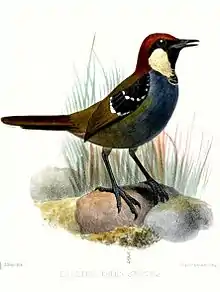| Jewel-babblers | |
|---|---|
 | |
| Spotted jewel-babbler (Ptilorrhoa leucosticta) | |
| Scientific classification | |
| Domain: | Eukaryota |
| Kingdom: | Animalia |
| Phylum: | Chordata |
| Class: | Aves |
| Order: | Passeriformes |
| Family: | Cinclosomatidae |
| Genus: | Ptilorrhoa J.L. Peters, 1940 |
| Type species | |
| Eupetes caerulescens[1] Temminck, 1836 | |
| Species | |
|
4, see text | |
 | |
| Global range (In red) | |
The jewel-babblers are the bird genus Ptilorrhoa in the family Cinclosomatidae. The genus contains four species that are endemic to New Guinea. The genus was once considered to contain the rail-babbler,[2] but that species is now considered to belong to its own family. The genus is closely related to the better known quail-thrushes (Cinclosoma) of New Guinea and Australia. Together with a number of other genera they comprise the family Cinclosomatidae, although the validity of this family as a whole has been questioned.
The jewel-babblers resemble the quail-thrushes in shape, being plump, long-tailed and short winged. They are adapted to life on the forest floor. The plumage of this genus is the most striking divergence from the quail-thrushes, having large amounts of blue and often with chestnut on the back. The throats of all species are white and the patch is mostly surrounded by a black edge. There is moderate levels of sexual dimorphism in the plumage, except in the dimorphic jewel-babbler where the female has no blue and is all chestnut coloured. When moving they hold the body horizontally to the ground, and bob their heads back and forth in a similar fashion to pigeons, and move their tail in a fashion similar to wagtails.
The jewel-babblers as a whole are not a well known or studied genus.
It contains the following species:
| Image | Common Name | Scientific name | Distribution |
|---|---|---|---|
 | Spotted jewel-babbler | Ptilorrhoa leucosticta | Highland forest, New Guinea |
 | Blue jewel-babbler | Ptilorrhoa caerulescens | subtropical or tropical moist lowland forests, New Guinea |
| Brown-headed jewel-babbler | Ptilorrhoa geislerorum | New Guinea | |
.jpg.webp) | Chestnut-backed jewel-babbler | Ptilorrhoa castanonota | subtropical or tropical moist lowland forests, New Guinea |
References
- ↑ "Cinclosomatidae". aviansystematics.org. The Trust for Avian Systematics. Retrieved 2023-07-16.
- ↑ Peters, James L. (1940). "A Genus for Eupetes caerulescens Temminck" (PDF). The Auk. 57 (1): 94.
- Del Hoyo, J.; Elliot, A. & Christie D. (editors). (2007). Handbook of the Birds of the World. Volume 12: Picathartes to Tits and Chickadees. Lynx Edicions. ISBN 978-84-96553-42-2